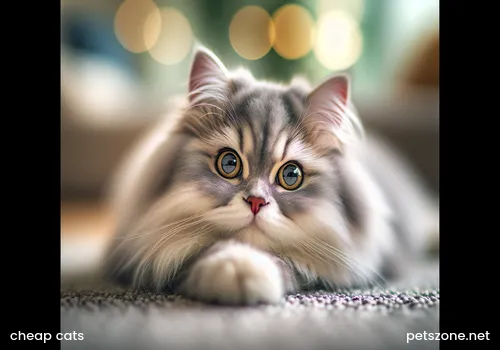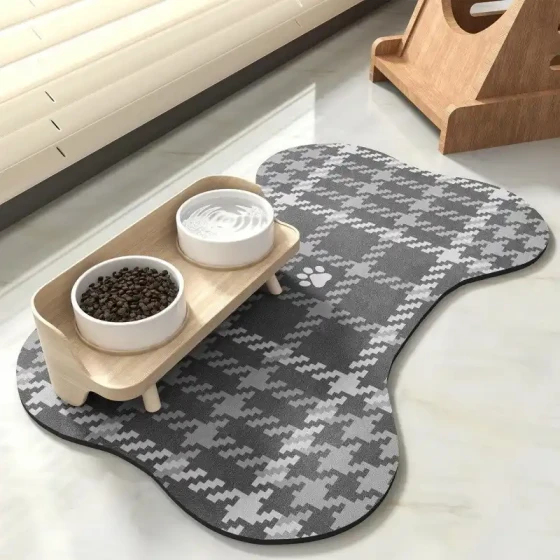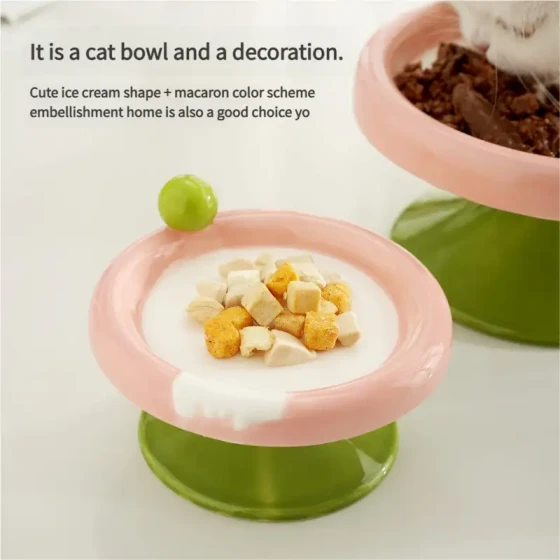Cheap and Easy-to-Raise Pet Cats_Top Ten Recommended Cats Most Suitable for Beginners
For first-time cat owners, choosing a cheap and easy-to-raise cat is vital. Cheap usually means lower acquisition cost, while easy-to-raise means the cat has low environmental requirements, is not prone to illness, and has a gentle temperament, helping new owners quickly adapt to cat life with fewer setbacks.

Among many cat breeds, some indeed stand out for their low maintenance requirements and friendly nature, making them ideal choices for beginners. This article will recommend the top ten cats most suitable for novices and provide localized care suggestions to help you easily start your cat-raising journey.
The "Cat" Tricks for Novices: Why Is Cheap and Easy-to-Raise Important?
For beginners, "cheap" not only refers to the initial purchase cost. The total cost of a cat includes adoption or purchase fees, daily food, litter, toys, medical care, etc. Some breeds are expensive and may have genetic diseases, resulting in substantial future medical expenses. "Easy-to-raise" means the cat adapts well, has a stable temperament, and is not picky with food, greatly lowering the difficulty and frustration for beginners.
Some "native" cats, such as Chinese rural cats, usually have low acquisition costs and can even be obtained for free through "adoption instead of buying." These cats have been naturally selected and usually have good constitutions, are less likely to get sick, and require simple daily care.
Top Ten Cats Most Suitable for Beginners
Considering factors like price, temperament, health, and care difficulty, the following ten cats are quite suitable for beginners:
-
Chinese Rural Cat (Tabby Cat, Ginger Cat, etc.):
- Features: Known as China's "national cat," the Chinese rural cat has a long history. Through natural selection, it is robust with strong adaptability, not picky with environment or food, and very resistant to illness. Their temperament varies but is generally intelligent, independent, and brave, and once bonded with an owner, they are very loyal and affectionate. Tabby cats are famous for their unique stripes and excellent mouse-catching ability. Ginger cats are loved for their “nine out of ten ginger cats are fat” easy-to-gain-weight body type and friendly personality.
- Care Suggestions: The Chinese rural cat requires simple care: regular brushing and keeping the litter box clean. They like to exercise, so prepare some toys or cat trees at home. Since they depend highly on their owner, changing their environment frequently is not recommended. Positive training, such as using scratching boards, can guide them.
- Price: Adoption is free; purchase price usually ranges from dozens to hundreds of RMB, with purebred tabby cats around 1000 RMB.
-
British Shorthair (Brit Shorthair):
- Features: Brit Shorthairs have a round and plump body, short thick legs, and short dense fur that feels like plush toys. They have a gentle, calm, and honest personality, are friendly to people, highly adaptable, and not easily sick. Being short-haired, their grooming is relatively simple.
- Care Suggestions: Brit Shorthairs require regular brushing to keep their fur clean. Their stomachs may be sensitive, so changing cat food should be gradual. Although gentle, they need enough activity space and toys. Pay attention to diet control to avoid obesity.
- Price: The price range is large, depending on bloodline and appearance, varying from several thousand to tens of thousands of RMB.
-
American Shorthair (Am Short Hair):
- Features: American Shorthairs are sturdy, gentle, lively, patient, and not prone to illness. They are friendly and like interacting with people, very suitable for families with children. Their fur is thick but easy to care for.
- Care Suggestions: American Shorthairs need regular brushing, sufficient food and water, and balanced nutrition. Though short-haired, they require proper exercise and playtime.
- Price: Prices similar to British Shorthair, from several thousand to tens of thousands of RMB.
-
Siamese Cat:
- Features: Siamese cats are smart, lively, active, and love interaction. They are loyal and affectionate to owners, sometimes quite "clingy." They adapt well and are not prone to illness.
- Care Suggestions: Siamese cats need enough exercise and play. They are somewhat sensitive to cold, so their bed needs to be warm. Fur care is simple but requires regular brushing. They're quite clean, so litter boxes and eating utensils must be kept tidy. Some Siamese cats are vocal, which should be noted.
- Price: Moderate price, generally several thousand RMB.
-
Russian Blue:
- Features: Russian Blues are medium-sized with elegant gray-blue fur, gentle temperament, emotionally rich, and relatively quiet. They might be shy with strangers but very loyal to owners. They are resistant to illness and have fewer allergy-causing proteins.
- Care Suggestions: Russian Blues are timid and need time to adapt to new environments. Though their fur is beautiful, they shed less. A quiet, comfortable resting place is necessary. Their kidneys may be delicate; wet food is recommended.
- Price: Relatively high, quality specimens can cost between 10,000 to 30,000 RMB.
-
Persian Cat:
- Features: Persians have gorgeous long hair and a distinctive flat face, quiet and gentle personality, not fond of exercise. They like staying indoors and get along well with family.
- Care Suggestions: Their long fur requires diligent grooming, daily brushing to prevent matting, and monthly baths are suggested. Their flat faces often cause tear stains and respiratory issues, requiring regular eye cleaning and good ventilation. Their digestive system may be sensitive; wet food is advised.
- Price: Wide price range, depending on lineage and appearance.
-
Maine Coon:
- Features: Maine Coons are large cats with friendly, gentle, loyal, lively, and playful temperaments. They rely heavily on owners and enjoy play and interaction. Despite their size, they do not require overly large activity spaces.
- Care Suggestions: Maine Coons have long, fluffy fur that needs regular brushing to prevent tangles and shedding. They need high-protein food and enough activity space and toys. Although tolerant of heat, summer cooling is still necessary.
- Price: Relatively high, usually several thousand to tens of thousands of RMB.
-
Sphynx Cat (Hairless Cat):
- Features: Sphynx cats have almost no fur, with outgoing, lively, and very affectionate personalities. They may be a good choice for people allergic to cat hair.
- Care Suggestions: Sphynx cats are sensitive to temperature and need indoor temperature between 25–30°C, requiring warmth in winter and sun and insect protection in summer. Without fur to absorb oils, their skin needs regular cleaning. Their stomachs can be fragile.
- Price: High price, usually above 10,000 RMB.
-
Bombay Cat:
- Features: Bombay cats have sleek black shiny fur and are known as "little black panthers." They are gentle, emotionally rich, smart, robust, and not prone to illness. They like closeness with people and tend to be clingy.
- Care Suggestions: Bombay cats are energetic, love jumping around at home, and need some activity space. Despite good constitution, daily care and health checks are important.
- Price: Moderately priced.
-
Exotic Shorthair (Persian Shorthair):
- Features: Exotic Shorthairs are a mix of Persian and American Shorthair, retaining the Persian's flat face and gentle personality, while having the American Shorthair’s short hair, making care easier than Persians. They are quiet, friendly, and adaptable.
- Care Suggestions: Similar to Persians, facial cleanliness to prevent tear stains and respiratory issues is necessary. Though short-haired, regular brushing is needed. Not suitable for vigorous exercise.
- Price: Wide price range.
Cats That Need Special Attention:
Scottish Fold: Although adorable in appearance, Scottish Folds carry a severe genetic defect causing a disease called "osteochondrodysplasia." This genetic disorder results in abnormal bone and cartilage development, causing pain, mobility difficulties, or even paralysis. Not all Scottish Folds will develop the condition, but all carry the risk, and currently no cure exists. Therefore, from a humane perspective, breeding or keeping Scottish Folds is not recommended.
Beginner Cat Raising Preparation List (Estimated in RMB)
Starting to raise a cat requires preparing some basic supplies besides the cat itself:
- Cat Food: Choose cat food based on age and breed. Regular cat food costs about 100–300 RMB monthly.
- Litter and Litter Box: Many types like tofu litter, bentonite, costing about 50–150 RMB monthly.
- Feeding Bowls and Water Bowls: A set costs from several tens to over a hundred RMB.
- Scratching Board/Cat Tree: To prevent cats from scratching furniture, ranging from dozens to several hundred RMB.
- Cat Bed: Provides a comfortable resting space, costing several tens to over a hundred RMB.
- Grooming Tools (Combs, Nail Clippers, etc.): A set costs about a few tens of RMB.
- Cat Toys: Teaser sticks, small balls, etc., costing dozens of RMB.
- Travel Carrier: For outings or vet visits, around a hundred RMB.
- Vaccines and Deworming: Kittens require multiple vaccines and regular deworming; initial costs are high with annual follow-ups costing a few hundred to a thousand RMB.
- Internal and External Deworming Medicine: Depends on product and cat weight, given monthly or quarterly, costing dozens to over a hundred RMB.
In summary, adopting a Chinese rural cat may require an initial supply investment of a few hundred to around a thousand RMB. Buying a pedigree cat will have higher initial costs. Monthly expenses for food, litter, treats, etc., are about 200–500 RMB. If the cat gets sick, medical costs can increase significantly.
Tips for Novice Cat Owners
- Adopt Instead of Buying: Many healthy and cute stray cats can be adopted through official channels, giving them a home and saving money.
- Prepare Your Home Well: Cats need a safe and comfortable environment. Remove dangerous items and prepare separate eating and resting areas.
- Patient Companionship: Cats need companionship, especially when newly home, requiring the owner's patience and care.
- Regular Check-ups and Vaccinations: Even healthy cats need regular exams and vaccines to prevent many diseases.
- Pay Attention to Behavioral Changes: Cats may show symptoms like loss of appetite, lethargy, vomiting, or diarrhea when ill — early detection and treatment is vital.
- Scientific Feeding: Choose nutritionally balanced cat food, feed regularly and in measured amounts, and avoid human food.
- Manage Shedding: Most cats shed; regular brushing and vacuuming help alleviate this issue.
Frequently Asked Questions
- Q1: Is it better for beginners to raise a male or female cat?
A1: Generally, neutered male cats tend to be gentler and more affectionate, while spayed females may be more independent. However, individual personality varies greatly, so it mainly depends on the cat itself. - Q2: At what age can a cat be brought home?
A2: It's recommended to bring the cat home after it is at least two months old and has completed basic vaccinations. - Q3: How to judge if a cat is healthy?
A3: Healthy cats have bright eyes, moist noses (except while sleeping), clean anuses, good spirit, and normal appetite. - Q4: Do cats need baths? How often?
A4: Cats are very clean and groom themselves; frequent baths are generally unnecessary. If the cat gets very dirty or needs treatment for skin diseases, bathing can be done under veterinary guidance. Frequent baths damage the skin’s natural oil barrier. - Q5: Why does my cat keep meowing?
A5: Cats meow for many reasons: hunger, thirst, wanting to play, seeking attention, stress, or illness. The cause should be considered in context.
Conclusion
Choosing a cheap and easy-to-raise cat is a wonderful start for beginners entering cat ownership. The important thing is to invest love and patience, provide a safe and comfortable home, and learn scientific feeding and care knowledge. May you find your own "fur baby" and enjoy warm and happy cat-raising times!





